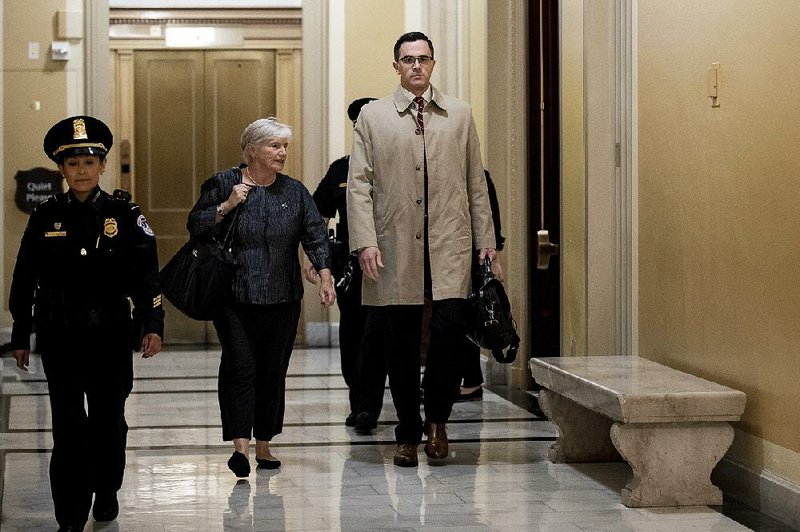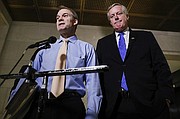WASHINGTON -- A White House adviser on Thursday corroborated key impeachment testimony from a senior U.S. diplomat who said last week that he was alarmed by efforts to pressure the Ukrainian government to investigate President Donald Trump's political rivals in exchange for nearly $400 million in military aid.
Tim Morrison, the top Russia and Europe adviser on Trump's National Security Council, told House investigators over eight hours of closed testimony that the "substance" of his conversations recalled by William Taylor, the acting ambassador to Ukraine, was "accurate," according to his prepared remarks and people familiar with Morrison's testimony.
In particular, Morrison verified that Trump's envoy to the European Union, Gordon Sondland, conveyed to a Ukrainian official that the military aid would be released if the country investigated an energy firm linked to the son of former Vice President Joe Biden. Morrison announced his resignation the night before his testimony.
In his opening remarks, he resisted drawing conclusions about Trump's involvement, and in subsequent testimony he made clear that he did not view the actions of the president or others involved as illegal or improper. Instead, he characterized their behavior as bad foreign policy of the sort that could potentially squander a "once-in-a-generation opportunity" afforded by Ukrainian President Volodymr Zelenskiy's election.
[Video not showing up above? Click here to view » https://www.youtube.com/watch?v=riWZExVOZS8]
"Ambassador Taylor and I had no reason to believe that the public release of the security sector assistance might be conditioned on a public statement reopening the Burisma investigation until my September 1, 2019 conversation with Ambassador Sondland," Morrison said. "Even then I hoped that Ambassador Sondland's strategy was exclusively his own and would not be considered by the leaders of the administration and Congress, who understood the strategic importance of Ukraine to our national security."
Republican lawmakers portrayed the opening remarks of the longtime GOP policy operative as shifting the debate favorably toward Trump.
They said Morrison's opening statement contradicted Lt. Col. Alexander Vindman, who testified Tuesday that he twice sounded the alarm over the Trump administration actions.
"It's a very compelling witness today that is giving testimony that contradicts some of the testimony we heard from Mr. Vindman," said Rep. Mark Meadows, R-N.C.
Morrison's testimony is significant given his proximity to decision-making in the White House and his status as a Trump political appointee rather than one of several career officials who in recent weeks have offered critical testimonies of Trump's Ukraine policy. Democrats hope Morrison's testimony will take away an oft-cited Republican complaint that many of the accounts from U.S. officials describing a quid pro quo are secondhand.
As Morrison gave his deposition Thursday, the House voted to formalize its impeachment inquiry, setting the stage for public hearings. The 232-196 vote split mostly along party lines.
'SINKING FEELING'
Morrison's testimony was sought because of his recurring presence in other depositions given by U.S. officials. House investigators also have requested testimony from Morrison's former boss John Bolton, the national security adviser whom Trump pushed out in September.
Morrison corroborated that he spoke with Taylor at least twice in early September. The first conversation was to alert him that Sondland had told the Ukrainians that no U.S. aid would be forthcoming until they announced an investigation of Burisma, the Ukrainian energy company that had hired Biden's son, Hunter, a person familiar with Morrison's testimony said. This person, like others, spoke on the condition of anonymity to discuss the private testimony.
Morrison also told lawmakers that he spoke with Taylor again on Sept. 7 to impart his "sinking feeling" about a worrisome conversation between Trump and Sondland, this person said. Morrison said that, during that conversation, Trump said he was not seeking a "quid pro quo" but then went on to insist that Zelenskiy must publicly announce he was opening investigations of Biden and 2016 election interference. Trump has espoused a debunked theory that the campaign to undermine American democracy was carried out in Ukraine and not Russia, as the U.S. intelligence agencies unanimously concluded.
Robert Luskin, an attorney for Sondland, said Sondland never mentioned Biden by name and did not know that Burisma was linked to the former vice president's son.
Morrison twice reached out to the National Security Council's attorneys with apparent concerns about Trump's conversations pertaining to Ukraine policy, according to various testimony. People familiar with his deposition said Morrison reported the July 25 phone call between Trump and Zelenskiy -- as Vindman had done. In September, Morrison also alerted National Security Council lawyers about a separate conversation between Trump and Sondland, according to Taylor's testimony to Congress.
Morrison told lawmakers that he notified the lawyers because he had specific concerns that a memo detailing Trump's call with Zelenskiy could be leaked. Its disclosure could prove problematic in politically polarized Washington, he said, adding that he was worried that it could affect bipartisan support for Ukraine in Congress and that it could affect how Ukraine perceived its relationship with the United States.
There is no tape recording of the July 25 call. The White House stopped taping presidential calls in the 1970s when President Richard Nixon recorded 3,700 hours of conversations, transcripts of which were used by Watergate investigators and during impeachment hearings that followed.
Instead, various officials listen into presidential calls and take extensive, real-time notes that are then turned into a rough transcript.
Morrison said the memo released by the White House "accurately and completely reflects the substance of the call," which some Democratic lawmakers have challenged in recent days.
Morrison told investigators that "the White House was holding up the security sector assistance passed by Congress" from former deputy national security adviser Charles Kupperman, who directed him to design a policy to show that the U.S. government still supported giving military aid to Ukraine. Morrison said he was "confident" that the cadre of high-ranking national security officials "could convince President Trump to release the aid" because Zelenskiy and the Ukrainian legislature "were genuinely invested in their anti-corruption agenda."
He added, however, that he had "no reason to believe" the Ukrainians knew U.S. aid was being withheld until Aug. 28, and that he did not suspect a possible quid pro quo surrounding the aid until Sondland told him as much on Sept. 1 -- information he relayed to Taylor later that day.
Morrison's testimony differs from Taylor's slightly on the details of what the arrangement entailed. Morrison recalled Sondland having told a senior Ukrainian official that the United States would be satisfied if Ukraine's prosecutor general would publicly commit to conducting the investigations Trump desired. Taylor's account said Ukraine's president would need to be the one who committed to the probes.
ELLIPSES AT ISSUE
Also Thursday, the White House pushed back on the idea that Vindman had suggested that the ellipses in the White House memo containing the rough transcript of the July phone call represented missing information.
White House spokeswoman Stephanie Grisham said in a statement that Vindman "never suggested filling in any words at any points where ellipses appear in the transcript." She added that because the House impeachment hearings are private, "we cannot confirm whether or not Lt. Col. Vindman himself made any such false claim."
Vindman, who worked at the White House National Security Council and monitored the July 25 phone call, told investigators he heard a discussion of Biden and Burisma. He also said Trump brought up that there are recordings of Joe Biden discussing corruption in Ukraine, according to people familiar with Tuesday's closed testimony.
Vindman testified to House investigators that he tried to suggest changes to the memo that was released by the White House, but was unsuccessful, the people said.
Separately, Kupperman asked a federal judge in Washington, D.C., on Thursday to decide whether he must comply with a House subpoena in the ongoing impeachment inquiry.
Kupperman filed a lawsuit last week to try to resolve conflicting orders from Congress and the White House over his participation in the investigation.
He did not appear for a House deposition Monday and is instead awaiting direction from U.S. District Judge Richard Leon after a court hearing was set for Thursday afternoon.
"Absent a definitive judgment from the Judicial Branch," Kupperman's lawyers said in the lawsuit, "Plaintiff will effectively be forced to adjudicate the constitutional dispute himself, and if he judges wrongly, he will inflict grave constitutional injury on either the House or the President."
Leon said in a court order Wednesday that the purpose of the hearing is to set a briefing schedule, indicating it was unlikely that he would immediately rule from the bench.
Information for this article was contributed by Carol D. Leonnig, John Hudson, Karoun Demirjian, Rachael Bade, Reis Thebault, Anne Gearan and Ann E. Marimow of The Washington Post; by Lisa Mascaro, Zeke J. Miller, Deb Riechmann, Mike Balsamo, Mary Clare Jalonick, Alan Fram and Matthew Lee of The Associated Press; and by Nicholas Fandos of The New York Times.
A Section on 11/01/2019

